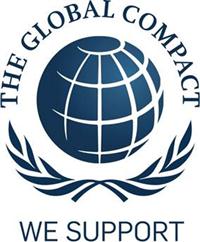THE UNITED NATIONS GLOBAL COMPACT
Our Main Partner in development

When he was the United Nations Secretary-General, Kofi Annan first proposed the Global Compact in an address to the world economic Forum on 31 January 1999. The Global Compact was launched at UN headquarters in New York on 26 July 2000. the Secretary-General challenged business leaders to join an international initiative – the Global Compact – that would bring companies together with UN agencies, labour and civil society to support ten principles in the areas of human rights, labour, environment, and anti-corruption. Through the power of collective action, the Global Compact seeks to advance responsible corporate citizenship so that business can be part of the solution to the challenges of globalisation. in this way, the private sector – in partnership with other social actors – can help realize the vision of a more sustainable and inclusive global economy. The Global Compact is a voluntary initiative whereby private sector companies agree to respect labour and human rights, protect the environment, and fight corruption internally within the organization and within the organization’s scope of influence in the community. MMD was one of the pioneering companies that joined the UN in launching and implementing the Global Compact in Egypt. It also is one of the main partners of the UN in implementing multi-lateral development projects in the country. The Global Compact is not a regulatory instrument it does not police, enforce or measure the behaviour or actions of companies. Rather, the Global Compact relies on public accountability, transparency and the enlightened self-interest of companies, labour and civil society to initiate and share substantive action in pursuing the principles upon which the Global Compact is based.
The ten principles are as follows:
- Support and respect human rights within the sphere of influence.
- Ensure that the company is not complicit in human rights abuses.
- Uphold freedom of association and recognize the right of collective bargaining.
- Ensure that the company is not employing forced or compulsory labor.
- Refrain from employing child labor.
- Elimination of discrimination in the hiring and firing policies.
- Support a precautionary approach to environmental challenges.
- Undertake initiatives to promote environmental responsibility.
- Encourage the development and diffusion of environmentally friendly technologies.
- Work against corruption in all its forms including extortion and bribery.
Today, the actors of the Global Compact- the private sector, NGO’s, Academic Institutions, UN agencies, and governments worldwide- are promoting the concept in order to better conduct businesses and extend the services and benefits to the community and the societies where we work.
Mansour Group has joined the UNGC in promoting and launching the concept in Egypt and acting as a role model to other companies to abide by the 10 principles and expand their social corporate responsibilities.
To this date, more than 60 Egyptian companies have joined the Global Compact since it was first launched in Egypt in 2004. June 16th 2005 commemorated the first anniversary of the initiative in Egypt . In collaboration with the UN, MMD has organized and sponsored a seminar that was held in the Alexandria Bibliotheca, encouraging more companies to adopt these principles in their everyday business.
Mansour Group is a big supporter of the Global Compact and is the representative of the Egyptian network. It is also a member of the Anti-Corruption Working Group and the Caring for Climate Working Group.
The Group is also heavily involved with the Human Rights working principals and is a core member of the Global Business Initiative on Human Rights which is closely linked to the Global Compact.

